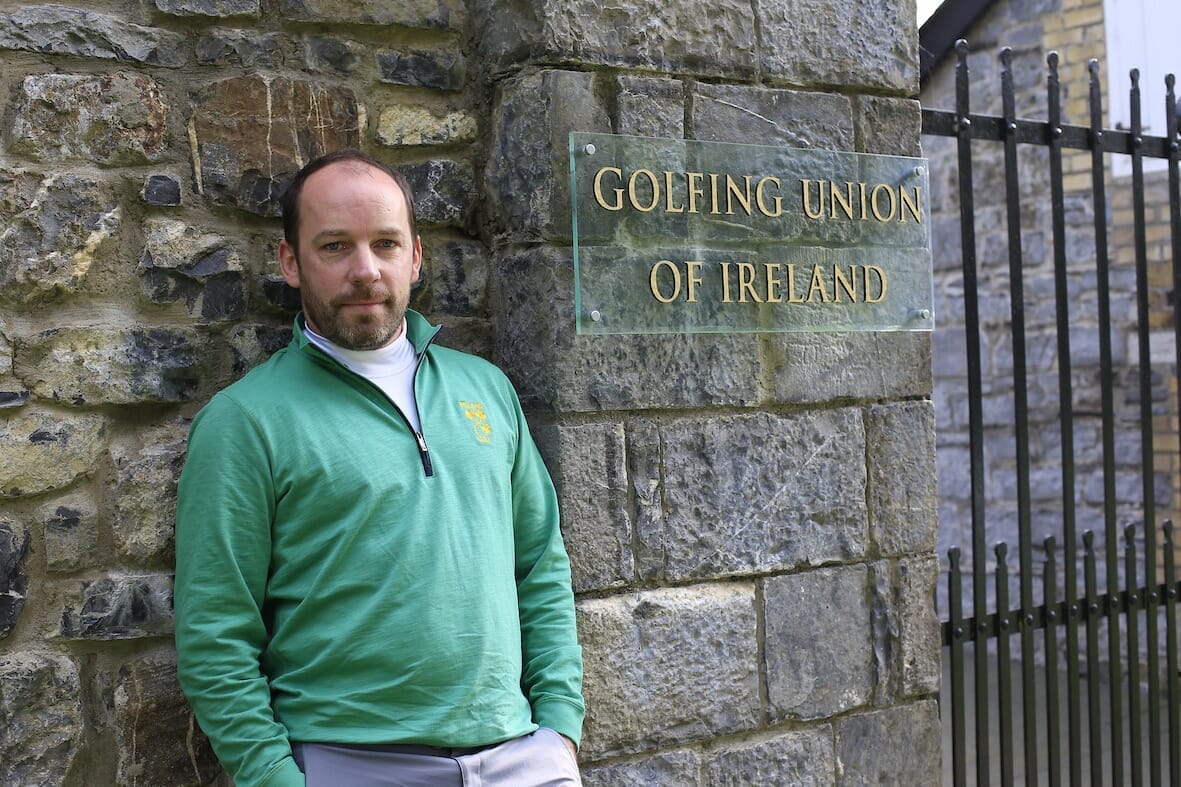Handicap cheats, pace of play and the challenges facing the game of golf in Ireland.
It’s been just a year since Pat Finn was appointed CEO of the Golfing Union of Ireland. Since joining the GUI back in 1998 the Thurles native has seen huge change in golf governance over the last two decades. Peter Finnan sat down with Pat to talk about his role and the overall health of the game in Ireland.
You are now exactly one year into the role of CEO of the GUI, how do you feel the role has gone so far and are you enjoying it?
Yeah, I think it’s gone really well and I am definitely enjoying the role. There has been a lot of change on the governance front and last year we appointed a board of the GUI for the first time and also established direct line of reporting between myself and the union branches. The Championships have run really well and we have ramped up our communications which was seen as a weakness in our strategic review.
As the CEO what are your primary objectives?
I guess I have one overall objective. That is to implement the strategy of the union along with the staff and volunteers. The organisation is structured so that the board and council decide on the strategy as opposed to me deciding and my role is to implement their decisions.
How are the discussions for one governing body’ proceeding and when should we have a result?
Well, the discussions around one governing body are going very well. To date we have had eleven full day meetings which have all been very positive. The philosophy of the discussions is “What’s right for the game of golf in Ireland”. Having a group of representatives sitting down from both the GUI and ILGU to determine what golf needs as opposed to what the GUI might want and what the ILGU want. It’s very difficult at this time to put a date on the launch of one governing body but we would hope to have a proposal ready for consideration by the members of both organisations (golf clubs) by the end of next year.
In what way will one governing body benefit club golfers in Ireland?
Well once one governing body is launched, for the first time ever a golf club will be a golf club. At the moment to satisfy the rules of the GUI and ILGU you have to have separate men’s and ladies clubs within your club. The primary benefit will be an equal environment which really has not existed throughout the history of golf in Ireland. Also, for the first time, golf will have one entity representing it. The disjointed nature of golf administration in Ireland with the GUI responsible for men’s amateur golf, ILGU for ladies and the PGA on the professional side means that it is nobody’s single responsibility to try grow the game or to represent golf in governance circles. I think we have lost out against other sports in this area and under one governing body golf will have a united voice.
“We do not have that culture of standing up to cheats but it is ruining club competitions and cheating is something that needs to be tackled by every golfer in the country”
As CEO you also have a hands-on involvement with the CGI. What are the main objectives moving forward with the CGI and what has it delivered for golfers in Ireland since its inception?
The CGI has three main functions. One is to provide an administrative structure to deal with the Olympics through the Olympic Council of Ireland and the International Golf Federation and appoint a team captain for golf. It’s a small piece of work but very significant. The other main functions are trying to grow the game and participation of golf and to provide club support. The reason the CGI exists is with both the GUI looking after the men’s amateur game and ILGU the ladies, there were certain functions that were falling between organisations like growing the game and supporting clubs so, along with the PGA in Ireland, the CGI was formed to look after those things. It’s been over two years since the CGI launched and it has made significant inroads into all these functions with the get into golf campaign and a huge amount of business resources available to all golf clubs.
You mentioned the Olympics as a remit of the CGI, how do you feel golf at the Olympic Games worked out earlier this year?
Well before Rio, as golf was going through the application process, I, like a lot of golfers was sceptical seeing the four Majors as where it is at and the Olympics were for other sports. I attended both men’s and ladies golf events at Rio and the whole experience in terms of organisation, coverage and reach certainly convinced me that golf belongs in the Olympics and I do think in time a gold medal will be held in the same regard as one of the four majors. The atmosphere at the event was electric and the IGF nailed it, ensuring golf’s reintroduction was a huge success.
Do you feel the Olympic format needs tweaking or should amateur golfers play?
There is no question in my mind that Olympic golf is a stage for the best players in the world to showcase our game to the world and not amateurs. The format is something people have questioned and I personally favour 72 hole singles stroke play as that is the standard across the board for tournament golf. I wouldn’t like to see the next Olympic golf tournament in 2020 have a major change making it into some sort of novelty event just for the sake of more medals and I think the IGF will have to really think about if they plan moving away from the 72 hole format.
Slow play and handicap cheating are really hurting the game more than ever. How are the GUI dealing with these serious blights on the game?
Well if we take slow play first. There is a limited amount we can do on pace of play throughout the golf clubs but more communication and education in this area is needed. It’s questionable whether the play of golf is slowing down. I have a view that it has always been pretty much the same pace but a big issue now is people’s time, with less time available to play golf it highlights slow play as a bigger issue. We do plan next year to have a slow play awareness month to try and raise awareness on slow play. In our own championships we survey players after each event and 75% of players were happy with the pace of play with only 25% seeing it as an issue so in our championships we are doing pretty well with ‘ready golf’ being one of the formats used recently. Hopefully after the slow play awareness month next year the education and awareness around pace of play will improve.
The other point is a much more serious blight on our game. For some reason in Ireland we don’t see handicap building as cheating. Somebody playing off a handicap purposely that is higher than their ability as opposed to playing their best all the time giving them shots in advantage over a field. The same people would never kick a ball in the rough or improve their lie but we need to educate people that handicap building is actually a worse form of cheating as its pre meditated. In the heat of a moment in any sport whether it’s a trip in hurling or football anything can happen. In golf it’s a fairly rare occurrence of improving a lie in the heat of a moment but it happens but pre-meditated cheating or manipulation of your handicap is way worse. As to what the GUI can do to deal with this, again it’s communication and education but the main way we can stamp out cheating in Ireland is peer pressure and people in clubs standing up to players who are doing this. We do not have that culture of standing up to cheats but it is ruining club competitions and cheating is something that needs to be tackled by every golfer in the country.
WAGR appears to be having a negative effect on some of our provincial championships. Has the GUI any plans to try help arrest this dilemma by guaranteeing that a certain quota of its elite panellists would play in our provincial championships each year?
I have heard this criticism of WAGR before and I don’t think WAGR is the problem. In the sense that if you eliminated it tomorrow, would the provincial championships and the Close regain strength? I don’t think they would. I think the issues are two fold on this. Firstly, there are way more players turning pro now than historically so when people compare the Close today versus the Close 20 years ago you don’t have the same pool of players and we have a much tighter pool of players now. The other major pull now is players playing in International events more. We are supporting the players in doing this and in many cases they are part of our squad and we pay their way in order to help them to be the best players they can possibly be. If we stop doing that and in some way force them to play in provincial championships, we may strengthen the field in the Championships but it would be to the determent of the player and we won’t be doing that.
The last few years we have seen many elite amateurs move into the professional ranks. Do you feel the money spent on the elite panels represent good value for money for the GUI and will this structure change moving forward?
It’s very difficult to gauge value for money and return on investment with elite golfers. What is a Major championship or five players on a Walker Cup team worth? There is no way to place a monetary value on that, it’s immeasurable. What I would say is that historically and now there is a disproportionate spend on high performance coaching by the GUI as opposed to spend on club support and golf participation so over time and through either the GUI, CGI or under one governing body there needs to be an increase in the percentages spent funding club supports, golf development at a more grass roots level.
What are your views on dwindling golf participation and how do you think we can combat it?
We are working with the ESRI now on a report into participation levels that will be published in a couple of months. From 2007 when it was at its peak until now, we’ve seen a 36% decrease in golf club membership in Ireland. It has leveled out for the last two years and we expect it will actually grow next year so there are positive signs. I think we are over the worst of it and golf clubs have had to tighten their belts and adapt to survive over the last eight years and thankfully we have not lost too many clubs in this period. The CGI is there as a service to golf clubs with many using it, but many more should as clubs that have engaged with and utilised the CGI programmes have seen growth.
I think, to stimulate growth and participation in golf going forward golf clubs need to change. Looking back they have not been the easiest places to walk into and for somebody new taking up the game it can be a daunting experience to try and play the game but even more daunting to try and fit into the golf club environment. Golf clubs need to embrace families more, young people more and have a re-think around junior golf and access to club facilities for juniors. Overall just make the golf club a place people feel more welcome. A lot of clubs have done this and are reaping the rewards of a thriving club but a lot more need to.
We’ve covered slow play and handicaps but are there other major factors affecting golf clubs in your opinion?
I feel another big challenge for golf clubs is to try and manage the expectations of members. Whether it’s maintenance of the clubhouse or the course, the idea of paying €500 for a yearly membership and expecting the golf club to be pristine all year round, every day, is simply impossible. Yet there are golfers that have those kinds of expectations. Similarly on the green fee side there are golfers with an expectation that they can pay €20 and play a course they expect to be in immaculate condition and if it’s not they will complain and look for their €20 back. I do think there is a bit of work to do in that area of managing members and visitors expectations.
The new Golfnet website has come in for some criticism in terms of navigation, what have the GUI done to combat this and are there further development plans?
It was a really ambitious idea to merge the GUI website, ILGU website and Golfnet into one place. Before Golfnet 2 was launched this was in three different places on three different websites. It was a very ambitious plan to merge them and in hindsight an error and a mistake on our part to make such a big leap all at the one time. Golf clubs and users were very patient over the first year of the project and we did a lot to improve the navigation and the site during this time. There are no immediate plans for more changes as Golfnet was an extremely costly project and a very complex setup. There will come a time when Golfnet will need re-development, whether that’s under one governing body or when the technology used is becoming redundant and at that point we will probably look at splitting out the site. It strikes me that we need a website that the golfer will go to and see their handicap or open fixtures and club directories relevant to club golfers and then a separate place which will be the organisations website for people who are really interested in amateur golf and want to engross themselves in that kind of information go somewhere else. There is just far too much information in one place at the moment and people find it hard to find what they are looking for.
The GUI have a number of corporate sponsors (AIG for example). Do you think they get good value for their sponsorship?
Well, AIG have been involved as a sponsor since 1998, so its 18 years now, and they are still involved so they are seeing the benefit of the sponsorship and association with the GUI. Our other significant new sponsor is Flogas who came on board this year for the first time sponsoring the Irish Amateur Open and they have been more than happy with the return they have got from their investment. I do think we offer great value in this area with great opportunities for others who might be interested in getting involved in supporting amateur golf.























Leave a comment